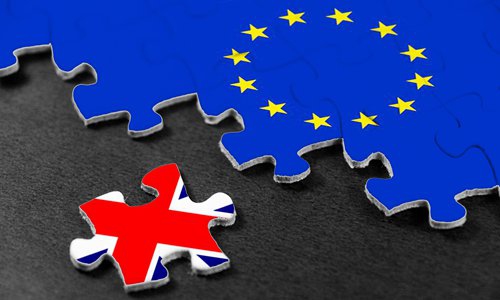
Brexit Photo: VCG
A post-Brexit deal between Britain and the European Union will not be easy to achieve, the British government's chief negotiator David Frost said Friday after the latest round of talks ended.
"We have just concluded the seventh round of negotiations with the EU. As I said last week, agreement is still possible, and it is still our goal, but it is clear that it will not be easy to achieve," Frost said in the statement released Friday.
At the conclusion of the latest round of talks in Brussels, Frost said substantive work continues to be necessary across a range of different areas of potential Britain-EU future cooperation if an agreement is to be delivered.
"We have had useful discussions this week but there has been little progress," Frost said.
"The EU is still insisting not only that we must accept continuity with EU state aid and fisheries policy, but also that this must be agreed before any further substantive work can be done in any other area of the negotiation, including on legal texts," he added.
Frost said the EU stance made it unnecessarily difficult to make progress. There are other significant areas which remain to be resolved and, even where there is a broad understanding between negotiators, there is a lot of detail to work through, he said, adding: "Time is short for both sides."
Frost said Britain will continue to work hard to reach an agreement with the EU, adding that chief negotiators and their teams have agreed to remain in close contact over the next two weeks before the next round of talks in London in the week of Sept. 7.
On fisheries, one of the sticking points, London says its position remains unchanged, insisting that it will not accept any proposals which compromise British sovereignty over its own fishing waters.
Local media reported that there was no progress during the latest round of talks on quota sharing. The EU reiterated that British position was a no go for Brussels, and the EU was only prepared to accept minor changes at best.
On the other major issue of a so-called level playing field, a key challenge remains on subsidy control.
Britain ended its EU membership on Jan 31 but is still following EU rules during the transition period until Dec 31 to enable a permanent future trade deal to be reached. During this period, Britain would have to pay into EU funds but have no say in laws imposed by Brussels.
The EU's chief negotiator for relations with Britain, Michel Barnier, has said a draft agreement needs to be in place by October to enable it to be ratified by the EU's 27 member states.
Speaking during a press conference in Brussels on Friday, Barnier said he was "disappointed, concerned and surprised" and the latest talks were "going backwards" rather than forwards.
If Britain and the EU fail to secure a trade deal before the transitional period expires, both sides will trade under the World Trade Organization terms, under which new border controls and tariffs will mean extra cost for their trade.
